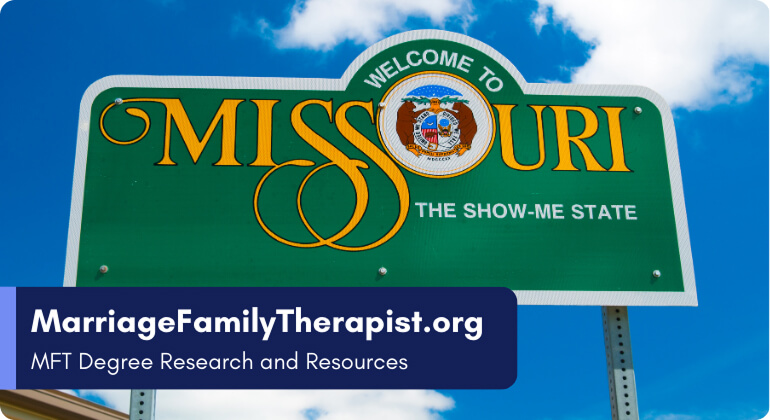Marriage & Family Therapy (MFT) Degree Programs in Missouri 2025
Missouri offers a range of accredited Marriage and Family Therapy (MFT) programs, providing students with high-quality training and a clear path to state licensure. The state has a growing need for licensed therapists, particularly in mental health clinics, school-based programs, and private practices. Missouri’s emphasis on family-centered behavioral health services ensures that LMFTs play a key role in addressing relational challenges, trauma recovery, and mental health issues affecting individuals, couples, and families.
Missouri’s MFT programs incorporate a mix of theoretical knowledge and hands-on clinical training, requiring students to complete practicum and internship placements in diverse mental health settings. Many universities offer traditional on-campus programs, hybrid learning models, and online options, providing flexibility for working professionals and full-time students alike.
With the statewide expansion of mental health services, MFT graduates in Missouri can find employment opportunities in hospitals, substance abuse treatment facilities, community counseling centers, and private therapy practices. As teletherapy becomes more integrated into mental health services, many LMFTs in Missouri are also able to work in virtual counseling settings.
In this guide
2026 Best Marriage & Family Therapy (MFT) Programs in Missouri
University of Missouri-St Louis
Saint Louis, MO - Public 4-Year - umsl.edu
Graduate Certificate - Graduate Certificate in Couple, Marriage, and Family Counseling
Campus Based - Visit Website
The University of Missouri-St. Louis provides a Graduate Certificate in Couple, Marriage, and Family Counseling for mental health professionals aiming to advance their skills. This 12-credit hour campus-based program delivers in-depth training in therapeutic theories and clinical practices, emphasizing supervised experience with couples and families. It requires a 3.0 GPA, two recommendation letters, and a personal statement, with application deadlines in fall, spring, and summer. No entrance exam is specified for this graduate-level program, focusing on enhancing expertise in relationship dynamics and family systems counseling.
- 12 credit hour program
- Supervised clinical experience
- Counseling couples/families focus
- 3.0 GPA requirement
- Two recommendation letters needed
- Fall application deadline: July 1
- Spring application deadline: Dec 1
- Summer application deadline: May 1
- Graduate mental health program option
- Two-page personal statement required
MFT Programs in Missouri
Missouri has several COAMFTE-accredited and regionally accredited MFT programs, ensuring that students receive comprehensive training that aligns with national and state licensing requirements.
These programs focus on family systems therapy, ethical practice, psychological assessment, and culturally competent counseling, preparing students for clinical work in diverse therapy settings. Many universities also partner with local mental health organizations, hospitals, and state-funded counseling services, ensuring that students gain valuable hands-on experience.
Graduates of Missouri’s MFT programs frequently find employment in behavioral health agencies, private practices, school counseling programs, and nonprofit organizations, helping to address the growing demand for licensed therapists in the state.
Saint Louis University – Couple and Family Therapy (MA)
- COAMFTE-accredited.
- Focus on systemic theory, research, and clinical practice.
- Emphasis on social justice and ethical practice.
Mercy College of Health Sciences – Marriage and Family Therapy (MA)
- Not COAMFTE-accredited.
- Integrates behavioral healthcare with systemic family therapy.
- Emphasis on values-based education.
- CACREP Accredited
- Not COAMFTE-accredited as a standalone MFT program.
- Offers both online and in-person options
- Concentration prepares graduates to work with families and individuals.
Missouri’s Quickest MFT Programs
For aspiring Marriage and Family Therapists seeking efficient training in Missouri, Saint Louis University’s Couple and Family Therapy (MA) program presents a potentially accelerated path. While individual timelines vary, the program’s structure, combined with a hybrid format, allows highly motivated students to complete the degree requirements in approximately 2.5 years. This accelerated pace hinges on consistent enrollment, strategic course scheduling, and timely completion of clinical practicum hours. It’s crucial to connect directly with program advisors to develop a personalized academic plan that aligns with individual learning styles and commitment levels to achieve this faster completion timeline. Keep in mind the timeframe is an estimate and may be influenced by external factors like practicum placement availability.
Missouri’s Cheapest MFT Programs
Determining the most affordable MFT programs in Missouri requires evaluating tuition, fees, and additional costs such as books, technology fees, and clinical training expenses. While Missouri does not have public universities offering COAMFTE-accredited MFT programs, students can pursue cost-effective alternatives through private institutions or online hybrid programs from accredited universities in neighboring states.
One notable option within Missouri is Midwestern Baptist Theological Seminary, which offers a Master of Arts in Counseling with an MFT emphasis. While not COAMFTE-accredited as a standalone MFT program, it provides a lower-cost pathway, with tuition estimated at $310 per credit hour, totaling approximately $18,600 for a 60-credit program (excluding fees). The university also offers financial aid opportunities, including scholarships, grants, and assistantships.
Additionally, public universities in nearby states, such as the University of Arkansas and Oklahoma Baptist University, offer COAMFTE-accredited MFT programs with regional tuition discounts for Missouri residents, making them viable and cost-effective alternatives.
For students pursuing careers in underserved areas, Missouri provides loan forgiveness programs for LMFTs working in rural or state-funded mental health facilities, ensuring financial support for graduates entering the mental health workforce.
How to Become Licensed as an LMFT in Missouri
Becoming a Licensed Marriage and Family Therapist (LMFT) in Missouri requires a combination of education, supervised experience, and successful completion of examinations. The process generally involves the following steps:
- Earn a Qualifying Master’s or Doctoral Degree: You must graduate from a COAMFTE-accredited program or a program determined by the Missouri Committee for Marital and Family Therapists to be the equivalent. The degree should be in marriage and family therapy or a related mental health field with coursework specifically addressing marriage and family therapy theory, assessment, and treatment.
- Complete Supervised Clinical Experience: After graduating, you must accrue the required hours of supervised clinical experience. As of my last update, this generally includes a minimum number of hours (often around 3,000) of supervised clinical work, including a specified number of hours providing direct therapy to couples and families and a specified number of hours of supervision with an approved supervisor. The supervision must meet the requirements outlined by the Missouri State Committee for Marital and Family Therapists.
- Pass the Required Examination: You must pass the Examination in Marital and Family Therapy administered by the Association of Marital and Family Therapy Regulatory Boards (AMFTRB). You’ll typically need to apply for and receive approval from the Missouri Committee before you can register for the exam.
- Apply for Licensure: Once you’ve met the educational, supervised experience, and examination requirements, you can apply for licensure as an LMFT with the Missouri State Committee for Marital and Family Therapists. The application process includes submitting transcripts, verification of supervised experience, examination scores, and other required documentation.
- Maintain Licensure: After receiving your LMFT license, you must maintain it by completing continuing education requirements and adhering to the ethical standards set forth by the Missouri State Committee for Marital and Family Therapists.
LMFT Career & Salary Outlook in Missouri
Marriage and Family Therapists in Missouri work in a wide range of clinical and community settings, including private practices, hospitals, school-based mental health programs, and government-funded behavioral health initiatives. The average salary for LMFTs in Missouri is $59,200 per year, with experienced professionals earning over $87,000 annually.
Salary levels vary based on location, specialization, and work setting. LMFTs working in St. Louis, Kansas City, and Springfield tend to earn higher salaries due to greater demand for mental health services, while those in rural areas may qualify for state-funded loan forgiveness programs.
Missouri’s expanding teletherapy sector has also opened up new job opportunities, allowing LMFTs to provide remote counseling services across the state. With growing mental health awareness and increased state investment in behavioral health, LMFTs in Missouri can expect strong career stability and long-term job growth.
Missouri offers a strong selection of MFT programs, structured pathways to licensure, and an expanding job market for licensed therapists. With a mix of affordable public universities, hybrid learning options, and diverse career opportunities, the state provides an excellent environment for students pursuing a Marriage and Family Therapy degree.


Related Articles
- The ROI of an MFT Degree: Analyzing the Financial Investment in Your Therapy Career
- Who Will You Treat as a Marriage & Family Therapist? A Career Guide for Aspiring MFTs
- Support That Affirms: Navigating Mental Health as LGBTQ+
- LMFT vs MFT: Is Licensure Necessary for Your Therapy Career?
- MFT Doctorate Degrees: DMFT vs PhD – Who Should Pursue Each Path?
- From Student to Therapist: What to Expect in Your MFT Clinical Internship